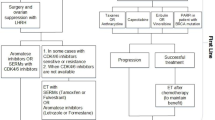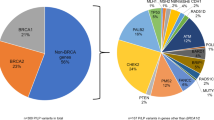Abstract
Breast cancer (BC) is the main worldwide neoplasia in women. The metabolic balance between xenobiotic absorption and elimination rates plays an important role in preventing DNA damage and, consequently, tumor development. The glutathione S-transferases (GSTs), such as GSTM1 and GSTT1, and the NAD(P)H quinone oxidoreductase are important enzymes involved in phase II detoxification reactions. Deletions in GSTM1 and GSTT1, and single-nucleotide polymorphism (SNP) in NQO1 (rs1800655) have been investigated in cancer context, revealing conflicting results. The present study analyzed these genetic polymorphisms in 121 BC patients and 151 BC-free controls in order to verify if they could act as susceptibility modifiers and/or prognostic factors. Binary logistic regressions adjusted by age were performed to assess associations between allelic variants and interactions in polymorphisms combination with BC susceptibility, but no significant association was found. Genotypes distribution was also compared between BC subtypes, but no significant difference was observed (p > 0.05). GSTM1 deletion was significantly associated with histopathological grade, with a greater proportion of patients presenting grade III tumors (p = 0.007). Univariate analysis identified tumor size as the only clinicopathological parameter potentially associated with recurrence risk in patients that received adjuvant chemotherapy (p < 0.1). Thus, logistic regression analysis adjusted by tumor size revealed a positive association between GSTT1 deletion and recurrence risk in general BC (OR 4.25; p = 0.04), while GSTM1 was negatively associated with recurrence risk in ER/PR+HER2− samples (OR 0.07; p = 0.03). In conclusion, the present study indicated that GSTT1 deletion was associated with increased recurrence risk, while GSTM1 correlated with worst prognosis parameters at diagnosis, but was negatively associated with recurrence risk in luminal subtype samples.
Similar content being viewed by others
References
Ferlay J, Soerjomataram I, Ervik M et al. GLOBOCAN 2012 v1.0, cancer incidence and mortality worldwide: IARC cancerbase no. 11 [Internet]. In: International agency for research on cancer. 2013 http://globocan.iarc.fr. Accessed 25 May 2015.
INCA. Estimate 2016: cancer incidence in Brazil. Rio de Janeiro: INCA edn; 2016.
Prat A, Pineda E, Adamo B, et al. Clinical implications of the intrinsic molecular subtypes of breast cancer. Breast. 2015;. doi:10.1016/j.breast.2015.07.008.
Kadlubar FF. Concluding remarks: symposium on genetic susceptibility to environmental toxicants. Mutat Res. 2001;482(1–2):111–3.
Shastry BS. Pharmacogenetics and the concept of individualized medicine. Pharmacog J. 2006;6(1):16–21. doi:10.1038/sj.tpj.6500338.
Parl FF. Glutathione S-transferase genotypes and cancer risk. Cancer Lett. 2005;221(2):123–9. doi:10.1016/j.canlet.2004.06.016.
Au WW, Oh HY, Grady J, Salama SA, Heo MY. Usefulness of genetic susceptibility and biomarkers for evaluation of environmental health risk. Environ Mol Mutagen. 2001;37(3):215–25.
Ross D, Kepa JK, Winski SL, Beall HD, Anwar A, Siegel D. NAD(P)H:quinone oxidoreductase 1 (NQO1): chemoprotection, bioactivation, gene regulation and genetic polymorphisms. Chem Biol Interact. 2000;129(1–2):77–97.
Nioi P, Hayes JD. Contribution of NAD(P)H:quinone oxidoreductase 1 to protection against carcinogenesis, and regulation of its gene by the Nrf2 basic-region leucine zipper and the arylhydrocarbon receptor basic helix-loop-helix transcription factors. Mutat Res. 2004;555(1–2):149–71. doi:10.1016/j.mrfmmm.2004.05.023.
Yuan W, Xu L, Chen W, et al. Evidence on the association between NQO1 Pro187Ser polymorphism and breast cancer risk in the current studies: a meta-analysis. Breast Cancer Res Treat. 2011;125(2):467–72. doi:10.1007/s10549-010-0966-0.
Traver RD, Siegel D, Beall HD, et al. Characterization of a polymorphism in NAD(P)H: quinone oxidoreductase (DT-diaphorase). Br J Cancer. 1997;75(1):69–75.
Traver RD, Horikoshi T, Danenberg KD, et al. NAD(P)H:quinone oxidoreductase gene expression in human colon carcinoma cells: characterization of a mutation which modulates DT-diaphorase activity and mitomycin sensitivity. Cancer Res. 1992;52(4):797–802.
Ross D, Traver RD, Siegel D, Kuehl BL, Misra V, Rauth AM. A polymorphism in NAD(P)H:quinone oxidoreductase (NQO1): relationship of a homozygous mutation at position 609 of the NQO1 cDNA to NQO1 activity. Br J Cancer. 1996;74(6):995–6.
Lanciotti M, Dufour C, Corral L, et al. Genetic polymorphism of NAD(P)H:quinone oxidoreductase is associated with an increased risk of infant acute lymphoblastic leukemia without MLL gene rearrangements. Leukemia. 2005;19(2):214–6. doi:10.1038/sj.leu.2403613.
Jamieson D, Cresti N, Bray J, et al. Two minor NQO1 and NQO2 alleles predict poor response of breast cancer patients to adjuvant doxorubicin and cyclophosphamide therapy. Pharmacog Genom. 2011;21(12):808–19. doi:10.1097/FPC.0b013e32834b6918.
Pimenta JR, Zuccherato LW, Debes AA, et al. Color and genomic ancestry in Brazilians: a study with forensic microsatellites. Human Hered. 2006;62(4):190–5. doi:10.1159/000096872.
Lins TC, Vieira RG, Abreu BS, Grattapaglia D, Pereira RW. Genetic composition of Brazilian population samples based on a set of twenty-eight ancestry informative SNPs. Am J Human Biol. 2009;. doi:10.1002/ajhb.20976.
Parra FC, Amado RC, Lambertucci JR, Rocha J, Antunes CM, Pena SD. Color and genomic ancestry in Brazilians. Procee Natl Acad Sci USA. 2003;100(1):177–82. doi:10.1073/pnas.0126614100.
Pena SD, Bastos-Rodrigues L, Pimenta JR, Bydlowski SP (2009) DNA tests probe the genomic ancestry of Brazilians. Brazilian journal of medical and biological research = Revista brasileira de pesquisas medicas e biologicas/Sociedade Brasileira de Biofisica [et al] 42 (10):870-876.
Wolff AC, Hammond ME, Hicks DG, et al. Recommendations for human epidermal growth factor receptor 2 testing in breast cancer: American society of clinical oncology/college of American pathologists clinical practice guideline update. J Clin Oncol. 2013;31(31):3997–4013. doi:10.1200/JCO.2013.50.9984.
Hammond ME, Hayes DF, Dowsett M, et al. American society of clinical oncology/College of American pathologists guideline recommendations for immunohistochemical testing of estrogen and progesterone receptors in breast cancer. J Clin Oncol. 2010;28(16):2784–95. doi:10.1200/JCO.2009.25.6529.
Abdel-Rahman SZ, El-Zein RA, Anwar WA, Au WW. A multiplex PCR procedures for polymorphic analysis of GSTM1 and GSTT1 genes in population studies. Cancer Lett. 1996;107:5.
Stopeck AT, Brown-Glaberman U, Wong HY, et al. The role of targeted therapy and biomarkers in breast cancer treatment. Clin Exp Metastasis. 2012;29(7):807–19. doi:10.1007/s10585-012-9496-y.
Autrup H. Genetic polymorphisms in human xenobiotica metabolizing enzymes as susceptibility factors in toxic response. Mutat Res. 2000;464(1):65–76.
Geisler SA, Olshan AF. GSTM1, GSTT1, and the risk of squamous cell carcinoma of the head and neck: a mini-HuGE review. Am J Epidemiol. 2001;154(2):95–105.
Gronau S, Koenig-Greger D, Jerg M, Riechelmann H. GSTM1 enzyme concentration and enzyme activity in correlation to the genotype of detoxification enzymes in squamous cell carcinoma of the oral cavity. Oral Dis. 2003;9(2):62–7.
Arruda VR, Grignolli CE, Goncalves MS, et al. Prevalence of homozygosity for the deleted alleles of glutathione S-transferase mu (GSTM1) and theta (GSTT1) among distinct ethnic groups from Brazil: relevance to environmental carcinogenesis? Clin Genet. 1998;54(3):210–4.
Losi-Guembarovski R, Colus IM, De Menezes RP, et al. Lack of association among polymorphic xenobiotic-metabolizing enzyme genotypes and the occurrence and progression of oral carcinoma in a Brazilian population. Anticancer Res. 2008;28(2A):1023–8.
Olshan AF, Weissler MC, Watson MA, Bell DA. GSTM1, GSTT1, GSTP1, CYP1A1, and NAT1 polymorphisms, tobacco use, and the risk of head and neck cancer. Cancer Epidemiol Biomark Preven. 2000;9(2):185–91.
Torresan C, Oliveira MM, Torrezan GT, et al. Genetic polymorphisms in oestrogen metabolic pathway and breast cancer: a positive association with combined CYP/GST genotypes. Clin Exp Med. 2008;8(2):65–71. doi:10.1007/s10238-008-0159-x.
Lajin B, Alachkar A. The NQO1 polymorphism C609T (Pro187Ser) and cancer susceptibility: a comprehensive meta-analysis. Br J Cancer. 2013;109(5):1325–37. doi:10.1038/bjc.2013.357.
Oda JM, de Oliveira KB, Guembarovski RL, et al. TGF-beta polymorphism and its expression correlated with CXCR4 expression in human breast cancer. Mol Biol Rep. 2012;39(12):10131–7. doi:10.1007/s11033-012-1887-2.
Gor PP, Su HI, Gray RJ, et al. Cyclophosphamide-metabolizing enzyme polymorphisms and survival outcomes after adjuvant chemotherapy for node-positive breast cancer: a retrospective cohort study. Breast Cancer Res BCR. 2010;12(3):R26. doi:10.1186/bcr2570.
Khedhaier A, Remadi S, Corbex M, et al. Glutathione S-transferases (GSTT1 and GSTM1) gene deletions in Tunisians: susceptibility and prognostic implications in breast carcinoma. Br J Cancer. 2003;89(8):1502–7. doi:10.1038/sj.bjc.6601292.
Ambrosone CB, Sweeney C, Coles BF, et al. Polymorphisms in glutathione S-transferases (GSTM1 and GSTT1) and survival after treatment for breast cancer. Cancer Res. 2001;61(19):7130–5.
Yang G, Shu XO, Ruan ZX, et al. Genetic polymorphisms in glutathione-S-transferase genes (GSTM1, GSTT1, GSTP1) and survival after chemotherapy for invasive breast carcinoma. Cancer. 2005;103(1):52–8. doi:10.1002/cncr.20729.
Acknowledgements
We acknowledge the volunteers who made this study possible, the Londrina Cancer Hospital and Orlando Sestari Primary Health Care Unit staff for helping during sample collection and patient’s recruitment.
Funding
This study was supported by the Conselho Nacional de Desenvolvimento Científico e Tecnológico—CNPq, the Fundação Araucária and the Coordenadoria de Pós-Graduação, Londrina State University, Brazil.
Author information
Authors and Affiliations
Corresponding author
Ethics declarations
Conflict of Interest Statement
The authors declare that they have no conflict of interest regarding the publication of the manuscript.
Ethical approval
All procedures performed in studies involving human participants were in accordance with the ethical standards of the institutional and/or national research committee and with the 1964 Helsinki declaration and its later amendments or comparable ethical standards.
Informed consent
Informed consent was obtained from all individual participants included in the study.
Rights and permissions
About this article
Cite this article
Campos, C.Z., Losi Guembarovski, R., de Oliveira, C.E.C. et al. Glutathione S-transferases deletions may act as prognosis and therapeutic markers in breast cancer. Clin Exp Med 18, 27–35 (2018). https://doi.org/10.1007/s10238-017-0461-6
Received:
Accepted:
Published:
Issue Date:
DOI: https://doi.org/10.1007/s10238-017-0461-6




